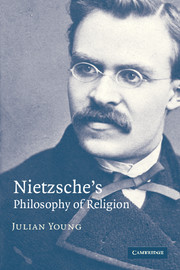Book contents
- Frontmatter
- Contents
- Acknowledgements
- List of abbreviations
- Introduction
- 1 Schopenhauer and ‘Man's Need for Metaphysics’
- 2 The Birth of Tragedy
- 3 Untimely Meditations
- 4 Human, All-too-Human
- 5 The Gay Science
- 6 Thus Spoke Zarathustra
- 7 Beyond Good and Evil
- 8 On the Genealogy of Morals
- 9 The Wagner Case
- 10 Twilight of the Idols
- 11 The Antichrist
- 12 Ecce Homo
- 13 Epilogue: Nietzsche in history
- Bibliography
- Index
12 - Ecce Homo
Published online by Cambridge University Press: 27 October 2009
- Frontmatter
- Contents
- Acknowledgements
- List of abbreviations
- Introduction
- 1 Schopenhauer and ‘Man's Need for Metaphysics’
- 2 The Birth of Tragedy
- 3 Untimely Meditations
- 4 Human, All-too-Human
- 5 The Gay Science
- 6 Thus Spoke Zarathustra
- 7 Beyond Good and Evil
- 8 On the Genealogy of Morals
- 9 The Wagner Case
- 10 Twilight of the Idols
- 11 The Antichrist
- 12 Ecce Homo
- 13 Epilogue: Nietzsche in history
- Bibliography
- Index
Summary
Since we have now reached the end of Nietzsche's path of thinking – Ecce Homo is the final major work – let me attempt to sum up the issues that have been at stake throughout.
WHY NIETZSCHE IS NOT AN ‘INDIVIDUALIST’
On the negative side, what I have been attacking is the ‘individualist’ reading of Nietzsche. What exactly is this reading?
There is, of course, what one might call society-friendly individualism. This is the position one might attribute to Freud, to the non-fraudulent Indian Guru, or, on a humbler level, to Joseph Pilates. Each in their own way offers a recipe for achieving at least an aspect of individual flourishing. What makes this kind of individualism unchallenging is that there is no hint of a conflict between the flourishing of one individual and that of others. Indeed nothing would please an ‘improver of mankind’ of this ilk more than that everyone should take up their form of meditation, yoga, diet or whatever.
The ‘individualism’ that has been so often attributed to Nietzsche – let us call it ‘anti-social individualism’ – however, is not of this innocuous variety. It differs from it in that individual flourishing is not taken to be compatible with the flourishing of society as a whole, but to be, on the contrary, incompatible with it. Specifically, Nietzsche is taken to hold that:
Only a very few, exceptional types are capable of any kind of significant flourishing, of living worthwhile lives.
The promotion of their flourishing is all that has intrinsic value and is the final end of human existence.
[…]
- Type
- Chapter
- Information
- Nietzsche's Philosophy of Religion , pp. 190 - 200Publisher: Cambridge University PressPrint publication year: 2006



